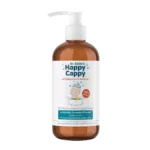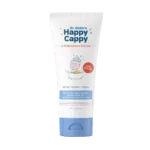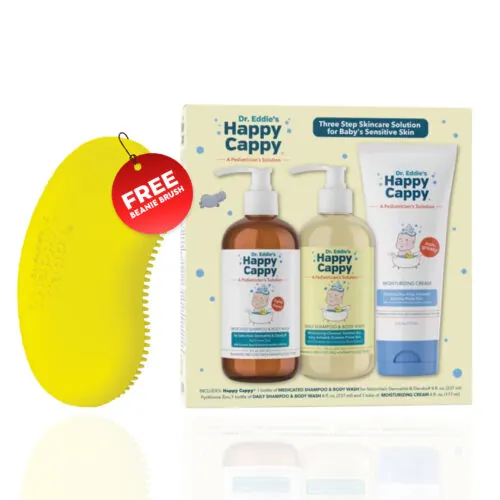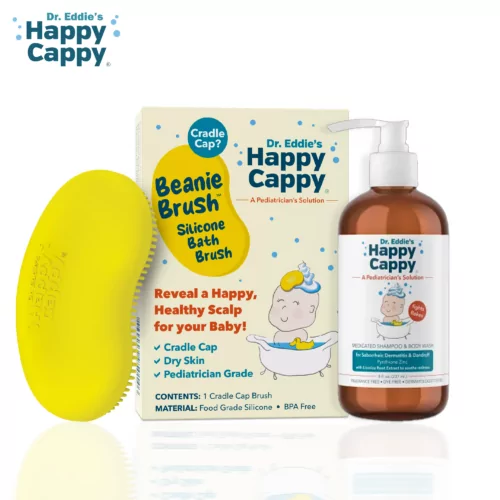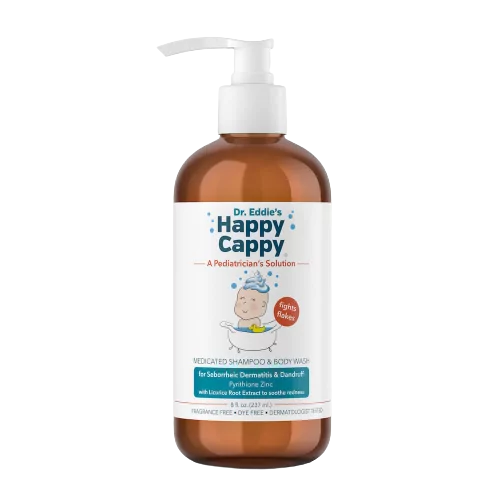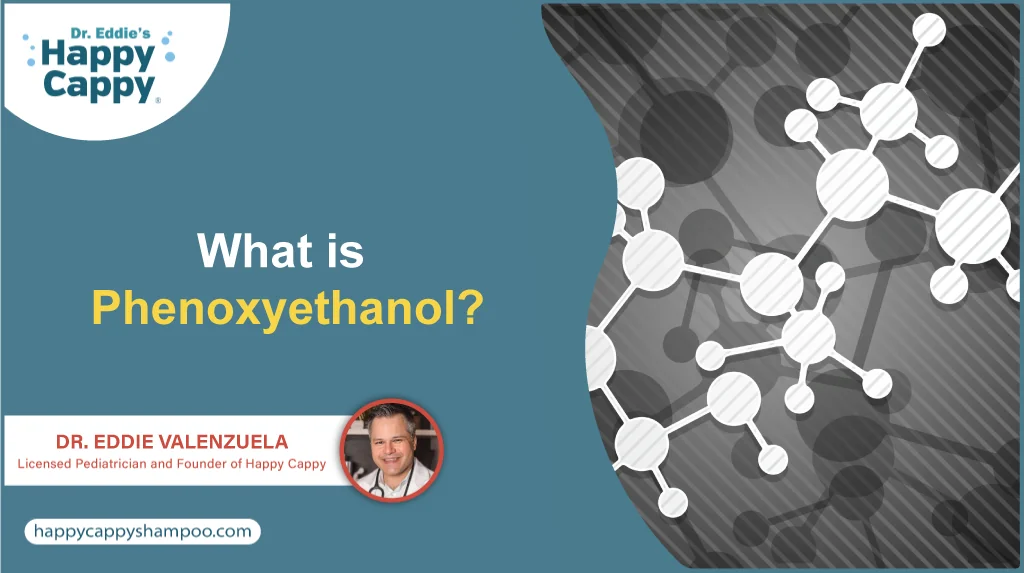
There are some skincare ingredients we are all quite familiar with, like aloe vera extract, licorice root extract, and glycerin. But then there are some other ingredients, mostly chemicals and preservatives, like phenoxyethanol, that most of us don’t know much about, even though they are found in our daily skincare products.
You may have come across the fact that parabens are harmful for your skin and health and should avoid them in your products. Yes, in the past 10 years, brands have stopped using parabens due to their side effects and instead shifted to a safer alternative, phenoxyethanol.
But with the increasing use of Phenoxyethanol in products, a lot of people are now concerned about ‘what exactly is it and is it safe to use?’
This blog is here to provide you with all the important information about phenoxyethanol, what it is, and why it is used in Happy Cappy Products.
What’s Phenoxyethanol?
Phenoxyethanol is a type of ether alcohol that has a mild rosy scent. It is known for its antimicrobial properties, which is why it is commonly used as a preservative in skincare, pharmaceutical, and even industrial products [1].
It can be naturally found in green tea and chicory; however, the version used in skincare products and cosmetics is synthetically produced, highly purified, and does not have odor or color [2].
In short, phenoxyethanol is a preservative. According to cosmeticsinfo.org, “A preservative is a natural or synthetic ingredient that is added to products such as foods, pharmaceuticals, and personal care products to prevent spoilage, whether from microbial growth or undesirable chemical changes [3].”
Any retail cosmetic product sold to a consumer has some sort of preservative or preservative system. Phenoxyethanol has been used since the 1980s as a safe alternative to parabens. Phenoxyethanol does not bind to or accumulate in the skin, and it is not thought to be an endocrine disruptor [4].
Phenoxyethanol kills many types of harmful microorganisms that can render a product dangerous or less effective. It is effective against what are called Gram-negative and Gram-positive bacteria as well as yeasts [5].
Now you might be wondering, ‘what is phenoxyethanol made from?’ It is produced by chemically combining phenol, which is derived from coal tar, and ethylene oxide. Both of these materials have potential risks on their own. However, once processed together, they result in an ingredient that is safe to be used in skincare, especially if it’s in low concentrations [2].
Other Names for Phenoxyethanol
Chemically, phenoxyethanol is known as a glycol ether, or, in simpler words, a solvent or preservative. However, depending on the product or the manufacturer, you might notice it listed under a variety of names. Some of the most common ones used are
- 2-Phenoxyethanol
- Euxyl K 400
- PhE
- Ethylene glycol monophenyl ether
- Dowanol
- Phenoxetol
- Arosol
- Rose ether
- Phenoxyethyl alcohol
- 2-phenoxy- ethanol
- Beta-hydroxyethyl phenyl ether
- 2-phenoxyethanol
- Ethanol
- Phenoxytol
What is Phenoxyethanol Used for?
Another common question that often comes to mind when you hear about this preservative is, ‘what does phenoxyethanol do or what is it used for?’ The truth is, it can be used in different ways, especially in the skincare and healthcare industries.
Preservative
The most common use of phenoxyethanol is as a preservative. Its main job as a preservative is to control the growth of harmful microbes such as bacteria, yeast, and molds that may spoil the product.
It is also added to increase the shelf life of the product. A spoiled product may contain risks such as allergic reaction, skin irritation, and, in severe cases, cancer. This is why it is usually advised not to use the products that are expired or close to their expiry date.
Fixative
It is also used as a fixative in certain products such as perfumes, deodorants, and soaps. As a fixative, it helps the fragrance of the product last longer on your skin. So if your soap makes you smell like berries for a long period, then most probably it’s the phenoxyethanol that’s making it happen.
Solvent
Phenoxyethanol is also used as a solvent in some products. This means that it helps the other ingredients to dissolve easily and properly in the formula. For example, ingredients such as ethylhexylglycerin don’t mix easily, so phenoxyethanol can be added to blend everything smoothly.
Phenoxyethanol can be found in many products that we use in our daily lives, such as
- Sunscreen
- Shampoo and conditioner
- Moisturizer and lotion
- Hair color and spray
- Nail Polish
- Shaving cream
- Makeup
- Body wash and soap
- Deodorant and perfume
- Toothpaste
- Hand sanitizer
- Baby lotion, wipes, and body wash
- Ultrasound gel
- Vaccines
This is just a small list of products that contain phenoxyethanol; apart from these, phenoxyethanol has been used as a topical antiseptic, it has been used as a preservative in vaccines, and it can be present in natural products such as green tea [4]. It is also used in the textile industry as a solvent.
Is Phenoxyethanol Safe?
One of the most common concerns about phenoxyethanol is, ‘Is phenoxyethanol safe for skin?’
The Cosmetic Ingredient Review was established 44 years ago and is supported by the Personal Care Products Council and supported by the US Food & Drug Administration, among others.
They have an Expert Panel made up of toxicologists and dermatologists that continuously evaluate compounds used in cosmetics and is an internationally respected organization [6a]. In the last review of compounds found in cosmetics, in 2011, the Expert Panel confirmed that the use of phenoxyethanol in a concentration of less than 1% is safe [7].
Additionally, according to the Cosmetic Ingredient Review in clinical studies, phenoxyethanol is not a skin irritant, nor does it cause delayed hypersensitivity. This means it will not cause reactions when this product is placed on the skin or after several weeks of use.
It would also be very rare for a person to experience skin irritation if exposed to the sun when using a product containing phenoxyethanol [7]. According to one classification scheme, it is practically non-toxic if consumed orally; however, we do not suggest eating Happy Cappy products [4].
According to the Environmental Working Group (EWG), the hazard rating of phenoxyethanol on their scoreboard is between 2 and 4, depending on how it’s used. The rating is lower when it is used in products that meet the industry safety standards or regulatory guidelines set by the U.S.
That is why Dr. Eddie ensures that it is used at a concentration of lower than 1% and according to the FDA’s recommended safety guidelines to keep the formula of the products both safe and effective.
Phenoxyethanol Side Effects
Now phenoxyethanol is generally considered safe for the skin; however, there are some people, which is usually in rare cases, who may experience certain side effects, such as hives, rashes, eczema flare-ups, and skin reactions.
In 2015, a case was reported where a man experienced a skin reaction 36 hours after undergoing a Doppler ultrasound examination. On conducting a patch test, it was confirmed that phenoxyethanol was the allergen that caused the reaction [8].
In 2021, a 59-year-old man experienced persistent hand dermatitis. After undergoing a patch test, it was revealed that the reaction was triggered by phenoxyethanol, which was present in the hand cream he had been using [9].
Even though such allergic reactions are rare, if you notice any irritation, discomfort, or reaction, then immediately consult a doctor. And to minimize the risk of any reaction, it is always advised to patch test a product before using it.
Is Phenoxyethanol Harmful for Use on Children?

The European Commission has a Scientific Committee called the Scientific Committee on Consumer Safety (SCCS) [10]. If you were wondering, the European Commission is similar to the Executive Branch of the U.S. government but pertains to the entire European Union.
The SCCS, “provides opinions on health and safety risks (chemical, biological, mechanical, and other physical risks) of non-food consumer products (e.g., cosmetic products and their ingredients, toys, textiles, clothing, personal care and household products) and services (e.g., tattooing, artificial sun tanning) for all of Europe [10].”
Use of phenoxyethanol as a preservative in cosmetic products was assessed by the Scientific Committee on Consumer Safety (SCCS) in 2016. “This assessment led the committee to conclude that phenoxyethanol was safe for consumers, including children of all ages, when used as a preservative in cosmetic products at a maximum concentration of 1% [10].”
Phenoxyethanol and Happy Cappy
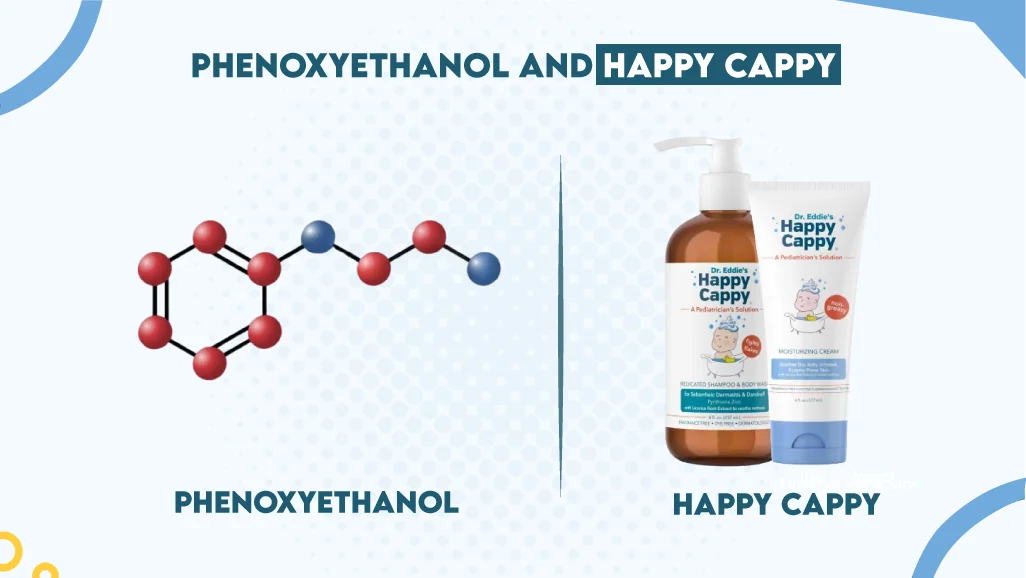
We hope you have enjoyed this scientific review of phenoxyethanol. We feel more comfortable knowing that this safe molecule is present in some of our products to prevent spoilage.
You will find it in both our Happy Cappy Moisturizing Cream for Eczema and Medicated Shampoo for Cradle Cap and Seborrheic Dermatitis. It helps keep these products safe, fresh, and effective for a long period. We trust phenoxyethanol because it has been proven safe even for the delicate, sensitive skin of people of all ages.
Conclusion
Phenoxyethanol plays an important role in keeping the products safe and increasing their shelf life. It is a reliable alternative to parabens and works as a preservative by preventing the growth of harmful bacteria that can spoil a product.
When used correctly, it helps maintain product quality without causing allergic reactions or dangerous health risks. It is considered safe when used at a concentration of 1% or less, and the product is made according to the FDA and U.S. safety guidelines.
At Happy Cappy, we are proud to use it responsibly to help keep our product formulas safe and gentle for all ages.
References
- [1] PubChem. (2005, March 26). Phenoxyethanol. Pubchem.ncbi.nlm.nih.gov. https://pubchem.ncbi.nlm.nih.gov/compound/Phenoxyethanol
- [2] Phenoxyethanol as a Safe and Important Preservative in Personal Care. (2014, April 22). Cosmetics & Toiletries. http://www.cosmeticsandtoiletries.com/research/chemistry/Phenoxyethanol-as-a-Safe-and-Important-Preservative-in-Personal-Carepremium-256198651.html
- [3] “Preservative Information.” https://www.cosmeticsinfo.org/?s=preservative Accessed 1 April, 2020.
- [4] Final Report on the Safety Assessment of Phenoxyethanol. Journal of the American College of Toxicology. Volume 9, Number 2, 199O Mary Ann Liebert, Inc., Publishers 9
- [5] Dreno B, et al. Safety review of phenoxyethanol when used as a preservative in cosmetics. J Eur Acad Dermatol Venereol.2019 Nov;33 Suppl 7:15-24. doi: 10.1111/jdv.15944.
- [6] “About the cosmetic ingredient review.” https://www.cir-safety.org/about . Accessed 1 April 2020.
- [7] Annual Review of Cosmetic Ingredient Safety Assessments: 2007-2010. International Journal of Toxicology. 30(Suppl. 2):73-127, 2011
- [8] Chasset, F., Soria, A., Moguelet, P., Mathian, A., Auger, Y., Francès, C., & Barete, S. (2015). Contact dermatitis due to ultrasound gel: A case report and published work review. The Journal of Dermatology, 43(3), 318–320. https://doi.org/10.1111/1346-8138.13066
- [9] Kolodziej, M., Kiewert, A., Skudlik, C., & Brans, R. (2021). Allergic contact dermatitis to phenoxyethanol: A rare, but possible cause of hand dermatitis. Contact Dermatitis, 86(4), 319–320. https://doi.org/10.1111/cod.14029
- [10] “Scientific Committee on Consumer Safety (SCCS).” https://health.ec.europa.eu/scientific-committees_en . Accessed 1 April 2020
Is phenoxyethanol cancerous?
No, there is no scientific research that proves that phenoxyethanol causes cancer; in fact, it is believed to be safe to be used in skincare products under 1% of concentration.
Is phenoxyethanol banned in the US?
No, phenoxyethanol is not banned for use in the US; however, for skincare products, it is only allowed to be used under 1% concentration, and the products should be manufactured according to the safety regulations of the FDA and the US government.
Is phenoxyethanol and alcohol the same?
No, even though phenoxyethanol looks like alcohol, it is not. It is a glycol ether, and its properties are different from those alcohols.
Does phenoxyethanol clog pores?
No, phenoxyethanol is believed to be non-comedogenic, whcih means it does not clog the pores.
Does phenoxyethanol clog pores?
No, phenoxyethanol is believed to be non-comedogenic, which means it does not clog the pores.
Is there another name for phenoxyethanol?
Yes, phenoxyethanol is listed by different names by manufacturers, such as:
2-Phenoxyethanol
Euxyl K 400
phE
Ethylene glycol monophynel ether
Phenoxyethyl Alcohol
2-Phenoxy-ethanol
Ethanol
Phenoxytol

